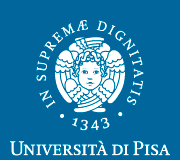
Email: joanna.gianessi@phd.unipi.it
Supervisore tesi: Prof. Carlo Pretti
Titolo Progetto: Ecotossicologia acquatica in uno scenario di Cambiamento Climatico a supporto dell’Ecofarmacovigilanza di antibiotici ad uso veterinario
Abstract: L’aumento del consumo di antibiotici nelle pratiche di medicina veterinaria richiede la massima attenzione per quanto riguarda l’impatto di questi inquinanti sull’ambiente, sugli animali e sull’uomo. Infatti, gli antibiotici, così come gli altri prodotti farmaceutici, una volta somministrati possono essere escreti sottoforma di una miscela di composti parentali e metaboliti, i quali potranno raggiungere l’ambiente terrestre e acquatico attraverso diverse fonti di contaminazione. Una volta raggiunto l’ambiente, questi composti possono bioaccumularsi e causare effetti avversi su organismi non-target, oltre a fenomeni di antibiotico-resistenza. Gli effetti dei farmaci antibiotici sugli organismi potrebbero essere influenzati dalle alterazioni dei fattori ambientali dovute a quello che viene definito come cambiamento climatico. Queste alterazioni possono influenzare il trasporto, la biodisponibilità e le caratteristiche dei contaminanti, ma anche la struttura e il funzionamento degli ecosistemi marini e la tolleranza/sensibilità degli organismi ai contaminanti. Lo scopo del presente progetto di dottorato è quello di valutare la tossicità degli antibiotici veterinari, su diversi livelli dell’organizzazione biologica e su diversi stadi vitali di organismi non-target rappresentativi dell’ecosistema acquatico. Inoltre, il presente progetto ha lo scopo di valutare come differenti fattori di stress, quali la presenza di antibiotici e alterazioni dei parametri ambientali dovute ai cambiamenti climatici (es. alterazioni del pH e della temperatura), agiscano sulle risposte di un set di marcatori biologici e fisiologici (biomarkers) di organismi bioindicatori dell’ecosistema acquatico.
Project title: Aquatic ecotoxicology in a Climate Change scenario to support Ecopharmacovigilance of veterinary antibiotics
Abstract: The increasing use of antimicrobial pharmaceuticals (APs) in veterinary medicine has led to their widespread presence in the environment, including aquatic ecosystems. Antibiotics can be excreted by animals, and their by-products can enter the environment through various pathways. Once in the environment, these compounds can persist for extended periods and accumulate in biota, posing a potential risk to non-target organisms and ecosystems. The effects of APs on organisms could be influenced by alterations in environmental factors due to human activities, including climate change. These changes can affect the transport, bioavailability, and characteristics of contaminants, as well as the structure and functioning of marine ecosystems, and the tolerance/sensitivity of organisms to contaminants. This PhD project aims to evaluate the toxicity of veterinary antibiotics on different levels of biological organization and on different life stages of non-target organisms that are representative of the aquatic ecosystem. Furthermore, the project aims to evaluate how different stress factors, such as the presence of antibiotics and alterations of environmental parameters due to climate change (e.g., changes in pH and temperature), affect the responses of a set of biological and physiological markers (biomarkers) of bioindicator organisms in the aquatic ecosystem.
Orcid ID: https://orcid.org/my-orcid?orcid=0009-0007-7143-2002
Pubblicazioni:
- Giannessi, J., Meucci, V., Intorre, L., Cuccaro, A., Freitas, R., De Marchi, L., … & Baratti, M. (2025). Combined effects of fluoroquinolone antibiotic enrofloxacin and rising sea temperatures on the health of the Mediterranean mussel (Mytilus galloprovincialis): Exploring physiological, biochemical, and energetic balance dynamics. Environmental Pollution, 366, 125500. https://doi.org/10.1016/j.envpol.2024.125500
- Giannessi, J., De Marchi, L., Meucci, V., Intorre, L., Monni, G., Baratti, M., & Pretti, C. (2024). Veterinary fluoroquinolones as emerging contaminants in marine environments: In vitro study of biochemical responses in subcellular fractions of the Mediterranean mussel (Mytilus galloprovincialis). Heliyon, 10(22). DOI: 10.1016/j.heliyon.2024.e40467
- Giannessi, J., De Marchi, L., Meucci, V., Intorre, L., Monni, G., Baratti, M., & Pretti, C. (2023). Subcellular tissue-specific responses of Mytilus galloprovincialis to fluoroquinolone antibiotics. Environmental Toxicology and Pharmacology, 104, 104306. https://doi.org/10.1016/j.etap.2023.104306
- Ravaglioli, C., De Marchi, L., Giannessi, J., Pretti, C., & Bulleri, F. (2024). Seagrass meadows as ocean acidification refugia for sea urchin larvae. Science of The Total Environment, 906, 167465. https://doi.org/10.1016/j.scitotenv.2023.167465
Comunicazioni orali a congresso:
- Giannessi J., Meucci V., Intorre L., Cuccaro A., Freitas R., De Marchi L., Monni G., Baratti M., Pretti C. “Interactive effects of enrofloxacin and ocean warming on the health and energetic balance of the Mediterranean mussel (Mytilus galloprovincialis)”. SIFTVet 2025, 10-11 April 2025, Pisa, Italy.
Poster a congresso:
- Giannessi, J., De Marchi, L., Meucci, V., Intorre, L., Monni, G., Baratti, M., Pretti, C. The effects of ocean warming on the biochemical and transcriptional responses of Mediterranean mussels exposed to the fluoroquinolone antibiotic enrofloxacin. 77th SISVET Conference, 12-14 June 2024, Parma, Italy.
- Giannessi, J., Cuccaro, A., De Marchi, L., Meucci, V., Intorre, L., Gabbrielli, B., Baratti, M., Pretti, C. The effects of ocean warming on the biochemical and transcriptional responses of Mediterranean mussels exposed to the fluoroquinolone antibiotic enrofloxacin. PRIMO22 International Symposium, 26-29 May 2024, Nantes, France.
- Giannessi, J., De Marchi, L., Meucci, V., Intorre, L., Monni, G., Baratti, M., Pretti, C. Subcellular responses of Mytilus galloprovincialis to fluoroquinolone antibiotics. PRIMO22 International Symposium, 26-29 May 2024, Nantes, France.
- Giannessi, J., De Marchi, L., Meucci, V., Intorre, L., Monni, G., Baratti, M., Pretti, C. Subcellular tissue-specific responses of Mytilus galloprovincialis to fluoroquinolone antibiotics. 76th SISVET Conference, 21-24 June 2023, Bari, Italy.
Premi:
Migliore presentazione poster al convegno internazionale PRIMO a Nantes, Francia (26-39 Maggio 2024) Titolo: The effects of ocean warming on the biochemical and transcriptional responses of Mediterranean mussels exposed to the fluoroquinolone antibiotic enrofloxacin. Autori: Giannessi, J., Cuccaro, A., De Marchi, L., Meucci, V., Intorre, L., Gabbrielli, B., Baratti, M., Pretti, C.
